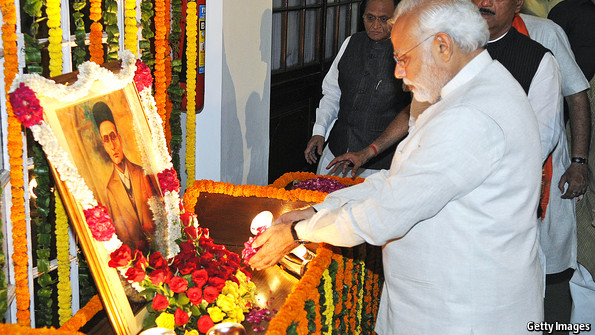ECONOMIST
 The newly elected Prime Minister Narendra Modi pays tribute to Vinayak Damodar Savarkar on his birth anniversary in Parliament on May 28, 2014
The newly elected Prime Minister Narendra Modi pays tribute to Vinayak Damodar Savarkar on his birth anniversary in Parliament on May 28, 2014
The controversial mentor of the Hindu right
In 1906, in a lodging house for Indian students in Highgate, a pleasant area of north London, a young lawyer called Mohandas Karamchand Gandhi dropped in on a law student called Vinayak Damodar Savarkar, who happened to be frying prawns at the time. Savarkar offered Gandhi some of his meal; Gandhi, a vegetarian, refused. Savarkar allegedly retorted that only a fool would attempt to resist the British without being fortified by animal protein.
The meeting is said to have begun hostilities between the two young Indian nationalists; whether or not the story is apocryphal, there were real reasons for antipathy. The two men had very different approaches to the struggle against Britain. Gandhi, who became leader of the Indian National Congress (INC), was a pacifist with an inclusive attitude towards Muslims and Christians. Savarkar, who would lead the Hindu Mahasabha, was a right-wing majoritarian who spawned the idea of hindutva, or Hindu-ness—the belief that the Hindu identity is inseparable from the Indian identity. Congress eclipsed the Mahasabha and, since history belongs to the victors, the story of India’s independence movement became one of non-violence. But the strand of thought that Savarkar represented was more important than is generally recognised, and is enjoying a revival.
A member of the Mahasabha broke away to form the paramilitary Rashtriya Swayamsevak Sangh (RSS), or national volunteer organisation, in 1925, modelled, some say, on the British army. A social rather than explicitly political organisation, it presented itself as the world’s largest non-governmental group, in which like-minded, khaki-uniformed men could gather for dawn calisthenics. It recruited boys at an impressionable age, as the Jesuits did, the better to inculcate them with discipline and with passion for the cause. One such was the eight-year-old Narendra Modi. The future prime minister (pictured, above, at a memorial to Savarkar) attended training sessions with the RSS, was subsequently inducted as a cadet, and in 1985 was assigned by the RSS to its political wing, the Bharatiya Janata Party, which he rose to lead.
Mr Modi is India’s strongest leader since Indira Gandhi, and its most controversial. The source of controversy is his failure in 2002, when chief minister of Gujarat, to avert a massacre of Muslims, which opponents attribute to a hostility to Muslims born of the ideology that Savarkar spawned. Mr Modi has never apologised for the massacre, though he said last year that he felt regret over them, as he would at seeing a puppy run over in the street. Nor has he made any attempt to distance himself from the RSS.
The Economist for more